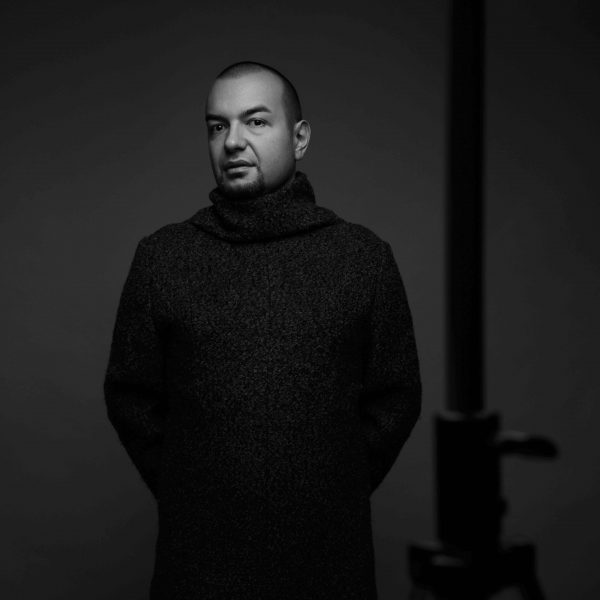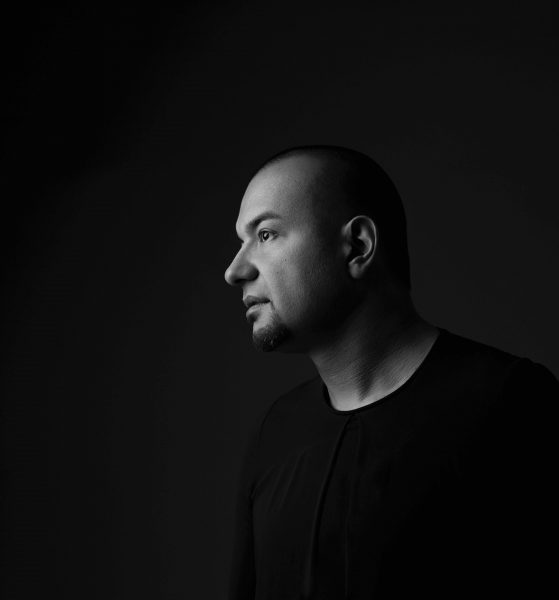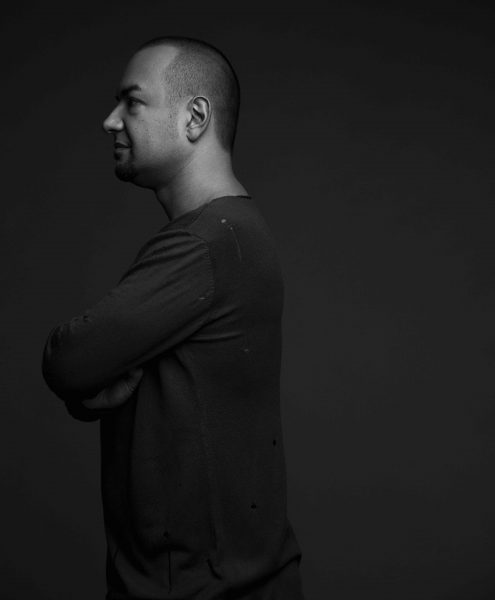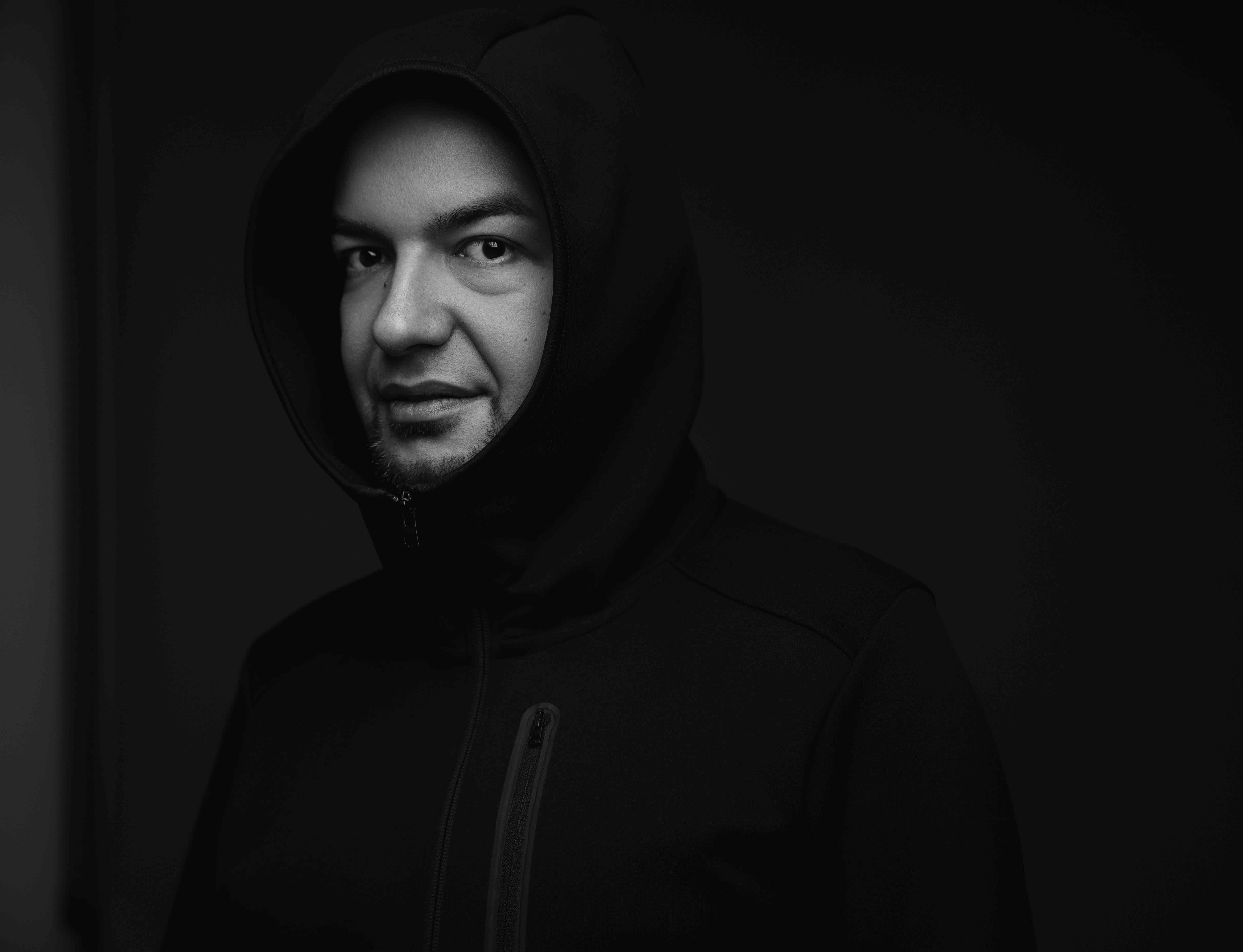*Photos by Peter Vulchev
We’re edging into Saturday morning at Jaeger and the incandescent ceiling in the basement is flickering on the pulse House bass groove. A tropical mood is sweeping across the dance floor, as hues of blue, green and red shine down from artificial heavens, in stark contrast to the brisk December temperatures on the surface. At the front, people in short sleeves are pressed up against the stage, waving hands like tendrils reaching up to the sky in some subconscious effort to reach at the celestial vocals currently projected through the upper frequencies of the sound system.
On stage, Strahil Velchev’s face is beaming. He’s assumed his KiNK alias for the second in a double appearance at Jaeger and the lower level has filled out for the second night. His hand hovers over a drum machine for a moment, waiting for some imperceptible cue from his audience to launch into the next phase of an improvised composition, but it doesn’t quite arrive as he turns suddenly to the Rhodes keyboard at his side to hammer out a faintly familiar theme.
His entire being is entrenched in the moment as his body convulses in time with the thin percussion where a simple snare and hi-hat arrangement are counting out syncopated beats between an elusive 4-4 rhythm. The audience is on the edge of an imaginary precipice, hanging on every note the Bulgarian artist is banging out on the reluctant vintage keyboard as the last formants of a vocal line dissipate into the porous log cabin walls.
They’re all waiting for the resolve, the pay-off and the absent kick drum to return, but at the next bar, they are denied their moment yet again and the audience collectively holds its breath in an audible “aah” for another phrase.
It’s a choreographed dance between Velchev and his audience. It’s a a continuous exercise in control, “delaying the pleasure” for the audience through instinct and manipulation and something that he’s mastered as a live performer over the last decade. It’s a fragile, yet symbiotic relationship and relishes in the unexpected directions the artist conducts like a sonic auteur. There’s a clear affinity for the machines and the music that has all but defined his career as an artist and yet it wasn’t quite what the artist had in mind when he started out his career as KiNK.
“I was originally a DJ, and I really didn’t like the idea of playing live” he told Electronic Beats in a candid piece from 2017. It’s a sentiment he re-iterates when we sit down for a meal in downtown Oslo ahead of his first appearance at Jaeger. It was “definitely not my second choice even,” he says before taking a bite of something crunchy, but he admits it’s been “key to international recognition” and today it’s exactly this context where he’s garnered much of his appeal as KiNK.

It’s been two years since we last saw Velchev as KiNK in Oslo, and buzz around the event has already exceeded our expectations. He has lost some weight since his last visit; his rounded facial features taking on more rigid angular dimension, and an athletic frame is bulging at places through a dark v-neck sweater. He’s “proud” of his recent weight loss and doesn’t mind “showing it off” on his ever-active Instagram profile, with shirtless beach photos dotting his summer timeline.
The Bulgarian producer, DJ and artist is in good spirits. It’s a rare occasion that he’s at an extended stopover, but our conversation precludes a double bill where he will perform as Kirilik for the first night, before assuming the recognisable KiNK alias for the next. He has just finished his soundcheck for Kirilik; a hybrid live set that jumps between pre-recorded samples played from CDJs accompanied by drum machine, and he’s eager to talk about this relatively new Techno project as we find our seats in a predominantly vacant dining room.
“I started the Kirilik project 5 years ago,” explains Velchev before we even sit down. Kirilik was born from an interest in modular synthesisers, but he wasn’t able to find the right application for it, especially in the KiNK universe. “I found that with this instrument I couldn’t have the sounds as the centre of music,” and that led him down a path to a new side-project “which could accommodate the “more repetitive, more experimental” sounds he was coaxing from this new instrument.
He found the modular system “very delicate and fragile” and “impossible” to utilize in a performance and yet there was a wealth of sound at its core that he wanted to explore. He sampled these sounds to play them back on a trio of CDJs with a drum machine setting out the tempo, laying down the groundwork for a performance project that would eventually become Kirilik. It was conceived as a live project, something “you could only enjoy in the club” initially, but as requests started flooding in for gigs – “since techno is the new rock music” – he soon realised; “I need to give promoters an instrument” to draw attention to these events. He released two records on Len Faki’s Figure imprint, but like KiNK, Kirilik is anchored in the context of a live project, and unlike KiNK each performance is unique and performances bear absolutely no resemblance to the recorded archives.
Inspired by Jeff Mills’ use of locked grooves on three decks for the legendary Purpose Maker video from the nineties, Velchev employs the same techniques on the newer technology that dominate the clubbing landscape. The results are tactile and impulsive with hints of funky Detroit grooves and melodies snaking their way through pragmatic eurocentric beats. Watching the soundcheck there’s a flurry of hands, manipulating an extensive palette that appears to streak across vast musical languages in bold swathes of textural colour. There’s an instinctive in Velchev’s animated movements like an invisible tether pulling him from one phrase to the next with sounds like a visceral language gestating from inanimate machines.
“I’ve always liked manipulating sound” remembers Velchev of the formative years that has applied him with this skill. “From a very early age, I loved to play with the radio and the volume” and it’s this expressive exploration that has remained the basis of his experiments in music today. Although he played the piano as a child, he found he had “no great talent for traditional musical instruments” – even if his movements on our stage piano suggests otherwise. He had always been a “music lover” and even during Bulgaria’s communist years he “was buying Disco records,” but when the iron curtain fell in 1989, the “borders opened for western culture” and the allure of electronic music spoke directly to Velchev’s inquisitive nature.
“At that time the format changed from vinyl to cassette,” he recalls with street vendors selling pirated copies of dance music compilations to a new generation of kids like Velchev sampling the decadent delights of western dance floors across eastern Europe for the first time. Although “the club came quite later” and “DJing came (even) later because of budget,” Velchev had already started picking up a rudimentary understanding of DJing and electronic music through playing cassettes back to back. While he has “been doing this for a long time,” his first steps to international recognition only came quite recently in the scope of his biography and it culminates with the first drum machine he acquired a little over ten years ago. It was with that drum machine and some expert manipulation from his agent that the artist set forth on the career path that has made him the endearing artist and performer that he is today.
He credits his “ex-agent Kai Fischer” for pushing him into the live arena, but there’s always been an inherent affinity for this machine music that sets KiNK apart from his contemporaries, and is more than just experience. From a small jumble of wires and boxes he coaxes not only sounds and impulsive rhythms but a sweltering atmosphere that seems to arrive from some peripheral instinct. Even earlier, when he was still just a DJ, he “would abuse the controls on the mixer” in a similar pursuit, and while critics often accused him of “destroying the sound” back then, it has made for an exciting advantage on the stage today. Electronic music instruments remain an unceasing form of inspiration in Velchev’s child-like desires “to make noise” and after a period of development it’s reached a point where he can “actually enjoy it” today.
As KiNK, records started to emerge on small independent labels around Europe from 2005, but by 2010 he had started making impressive contributions on labels like Josh Wink’s Ovum and Boe Recordings. Records like Aphex KiNK EP and remixes for the likes of Tiga’s Turbo recordings had brought the sounds of KiNK to an audience beyond Bulgaria’s borders, cementing the sound of the artist alongside his ever-glowing reputation as a live performer. KiNK was to become that rare double threat, an artist who was able to bring that energy of dance record to a live show and back again to the record.

“Playing live really changed the way of making music,” for Velchev. Where before he would “program” his music “in the studio,” he soon “started making music on the stage.” In his 2017 LP Playground (Running Back), the effects are quite prominent. It’s nothing that comes down to a science, or theoretically discernible, but rather something more abstract. “It’s a feeling you can’t programme” in Velchev’s’ words and it goes “against all logic.” He started “performing in the studio” in an effort to “capture that spirit” of the live show he had cultivated as KiNK for the recorded format, developing these two apsects of his music side by side into a singular artistic identity.
Unpredictable forms that fall between rhythmical integers and melodic themes that float in some no-man’s land between semitones break with the functional traditions of House music. There’s a transience throughout a record like Playground as melodies come together for a moment before evaporating and phases linger unexpectedly and depart just as erratically. From the stomping insistence of “The Russian” to the dogged two-step rhythms of “Peter Plet Plete,” the record avoids the predetermined nature of club music in search of something beyond the superficial. The results intrigue, and while it’s mostly down to performance methods, Velchev admits that this unpredictability in his music is something that inherited in part from the musical traditions of Bulgaria.
“I cannot escape my roots, I cannot escape those rhythms,” explains Velchev through a mouthful of some “spicy” dish. It’s something that stems from Bulgaria’s folk traditions, in a music that is commonly considered gypsy music in the region, and presented in contemporary House music structures through the sounds of KiNK and even Kirilik to some extent. “I never liked our folk music,” the Bulgarian confesses, and in his youth there were even times when he absolutely “hated it.”
He started hearing traces of this traditional music however in the music coming in from the western front with groups like Orbital and Future sound of London sampling these familiar pieces in their albums and EPs. It led to an “aha moment” for Velchev in which he realised he could utilise these traditional elements in the same way “a foreigner would.”
“In a sense my music is very based on gypsy music,” he says before explaining, “because I’m always looking for those notes between the semitone” and those beats that don’t fall on regular beats. What might sound confusing to the conditioned ear is natural to Bulgarian folk traditions, because “you cannot count to four” in the same way and there’s very little that could equate to any western music theory. “In Bulgaria we don’t count,“ says Velchev, stressing his point with a smile, “we just dance.”
Alongside those western influences, producer, DJ, writer and cultural theorist, Stefan Goldmann played a significant role in Velchev’s newfound appreciation for this roots music. “Stefan is the guy who showed me the Bulgarian traditional music (in a new light)” he asserts, “showed me the beauty of gypsy music which I was denying at that time.” It was around that time that he produced his debut LP as KiNK, “Under Destruction.” Goldmann’s Macro label, unsurprisingly facilitated the album, and it’s an LP that Velchev is “most proud of” today. “It was not a big record, but in terms of personal achievement musically, that is a highlight.”
As KiNK, Velchev has largely feigned from the LP format, unless there’s some sense of “identity” to the record and while Playground’s identity derived and was inspired around the tactility of the instruments he used for that record, “Under Destruction” was the “only time” Velchev felt he had a “certain vision” and “something to say.”
It’s a record that falls awkwardly on the western ear. The unusual rhythm structures and atonal (in western standards) character of the music breaks step with the underlying nature of the music. It’s a record still very much directed at the dance floor, with kick drums falling on familiar intervals, but the esoteric expressions that lie beyond its foundations offer something more contemplative for the listener. It’s something of a “paradox” for Velchev too, who has always considered himself a “dancer first” and whose music has always relied on a functional aspect. “Being experimental and innovative is a passion for me, but (all) in the constraints of being a dancer.”
It’s this paradox that has taken Velchev into his latest venture, a record label called, Sofia. Velchev believes the label picks up where Under Destruction left off and it pays specific homage to the Bulgarian capital it is named after. After reconnecting with Konstantine Petrov, “an old friend” who had played a hand in KiNK’s early development and had shown him “how to make music in the nineties,” Velchev and Petrov created the label as an outlet for the sounds of the city. “We’re not praising Sofia” he says poignantly, but “Sofia is the city that influenced us more with a lot of negative and a lot of positive aspects. We are what we are and our music is what it is because we lived and met in the city.”
 The first release on the label came via KiNK, with the aptly titled “Home,” and in that record we find similarities to KiNK’s music from “Under Destruction” as tracks play on similar rhythmic and melodic themes, distilled down from traditional music, with titles like The Clock and The Grid redefining the concepts contained in their titles for western ears. Accompanying the release and future releases from a small, but dedicated community of artists, are a series of photos – most of which taken on phone – from Bulgarian DJ legend DJ Valentine. Alongside the music it consolidates a label that for the first time will distill some of that Bulgarian traditions into a contemporary platform.
The first release on the label came via KiNK, with the aptly titled “Home,” and in that record we find similarities to KiNK’s music from “Under Destruction” as tracks play on similar rhythmic and melodic themes, distilled down from traditional music, with titles like The Clock and The Grid redefining the concepts contained in their titles for western ears. Accompanying the release and future releases from a small, but dedicated community of artists, are a series of photos – most of which taken on phone – from Bulgarian DJ legend DJ Valentine. Alongside the music it consolidates a label that for the first time will distill some of that Bulgarian traditions into a contemporary platform.
Although Velchev had been toying with the idea of a label for the last four years it was only “with time, a certain idea crystalized” where there could be “a musical identity in the first record.” Home inaugurates this identity with KiNK’s now familiar Bulgarian intuitions where “the rhythm is out of the standard grid and the tonality is out of the standard scale” and the music takes on a very unique character as a result, which some might even consider experimental. “Some people would say it’s experimental,” agrees Velchev, “but for me it’s just the pure essence of KiNK.”
It’s hard to define that essence, because it’s an amalgam of extraneous factors, funneled down into this music. It’s a combination of his precocious love of machines and noise; a maturing appreciation for the folk traditions of his country; a reluctant live performer; and an enigmatic interpretation of House and Techno music made by Black Americans. KiNK and Kirilik coalesces around all these different aspects, and there is no other artist quite like him, because of these compounding elements. Even at a time when DJ culture and electronic music have become quite interchangeable, Velchev is still able to stand out and deliver something truly unique to the landscape, and especially now with this latest endeavour Sofia.
“Maybe I’ve never brought anything brand new to the scene,” he considers, “but what I like about my approach to making music is that I’m more open to trying things and going out of my comfort zone.“
Later that night as he debuts the Kirilik project to a Norwegian audience, the dance floor is in agreement, raising their hands in a predominant affirmation as we draw back the curtains on our guest. A coy smile streaks over Velchev’s face as he introduces the first strands of an archived modular synthesiser from one of the CDJs. The room is tenter hooks, people surging calmly towards the stage, and then suddenly without warning; a resolve and a bass-heavy kick-drum bursts into life with an approving “whoop” from the crowd.

